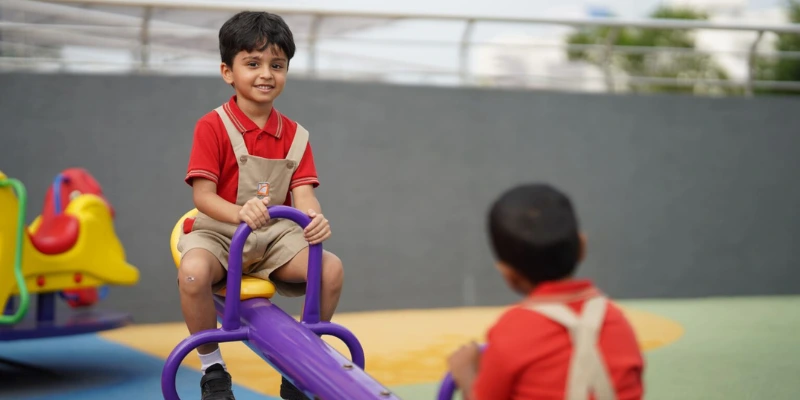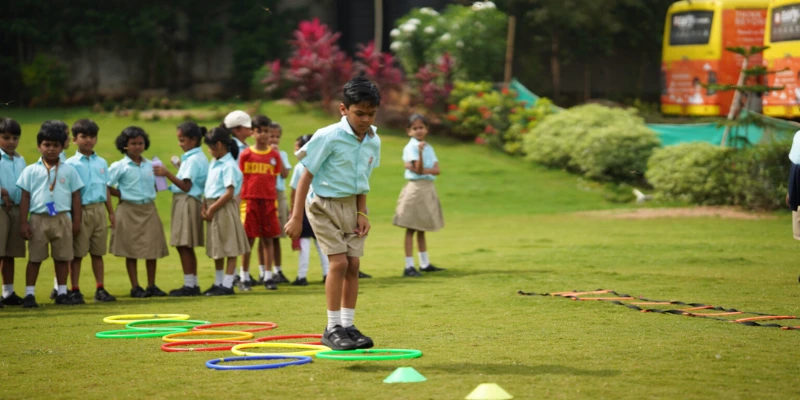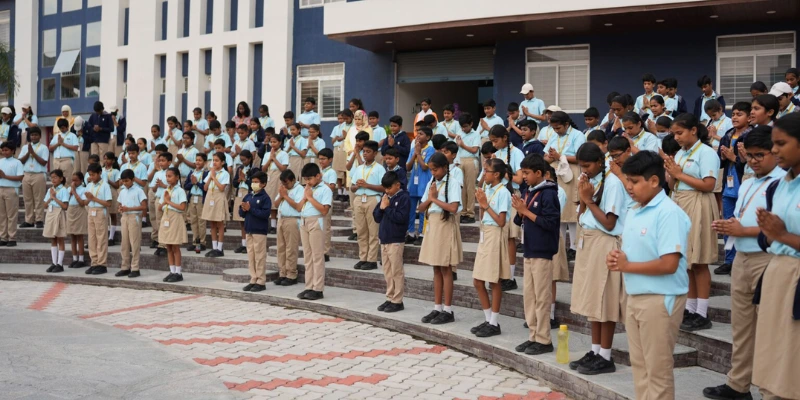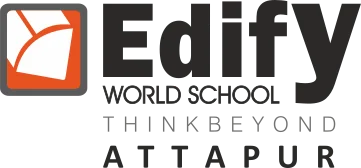Programs

Elementary School Program (IK1-IK3)
The specific learning outcomes delineate the crucial knowledge, skill sets, and attitudes that students are anticipated to exhibit, drawing from their cumulative learning experiences
As students enter Kindergarten, it marks an exciting yet challenging time for both parents and children. Embarking on this new adventure together presents a valuable learning opportunity for all involved. In Kindergarten, children cultivate and refine their abilities and skills to think creatively and collaborate effectively. Edify's facilitators, through a variety of innovative programs, serve as guides to enhance a child's sense of joy and provide the vocabulary to articulate their experiences. The school is dedicated to instilling in children the Character and Competence Profiles as outlined in the 3C Curriculum, closely aligned with core Indian values. Kindergarten students are taught and guided to understand
- Distinguishing between right and wrong
- behavior Expressing needs and feelings
- verbally in a socially acceptable manner
- Recognizing that others have feelings
- Engaging in independent or small-group
- play without constant supervision
- Understanding the importance of taking turns in sharing, conversation, or play
- Demonstrating politeness
- Developing decision-making skills
- Exploring new things by taking safe risks

Primary School Program (I-V)
The Edify Schools' Primary School Program is designed for students aged 5-11, focusing on establishing a robust academic foundation during this crucial developmental stage. The program aims to cultivate a reflective thinking approach in students, enabling them to identify and solve real-world problems. This is achieved through integrated thinking, facilitated by the trans-disciplinary learning approach.
The comprehensive learning process is structured around the trans-disciplinary 3C curriculum, employing an inquiry-based approach to foster the competence and character of learners. The characteristics of 21st-century learners are embedded within the character and competency profiles. The 3C Curriculum spans six inquiry modules, guiding students through a progressive participation in their own learning. This approach allows students to master subject-specific skills, with a focus on developing receptive (listening and reading) and productive (speaking and writing) language skills.
The curriculum encourages students to comprehend, draw inferences, relate to texts, read critically, and use language creatively and imaginatively in daily transactions and performances. Edify emphasizes the importance of developing cross-cultural understanding, sensitizing students to appreciate both similarities and differences across languages and cultures
In Mathematics, at the end of the program students are able to –
- Acquire an understanding of the numeration system
- Conduct computations relevant to daily activities
- Expand vocabulary related to spatial orientation
- Establish connections between logical functions and everyday life
- Gather, represent, and interpret simple data
- Recognize and extend simple patterns, and more.
In Inquiry Modules, focus is on developing the following in a student through the direct involvement and participation in the content –
- Observation and Reporting
- Discussion
- Expression
- Explanation
- Classification
- Questioning
- Analysis
- Experimentation
- Concern for justice and equality
- Cooperation.
Every learning activity meticulously planned in a class aims to foster age-specific developmental milestones, including fine motor skills, independent work skills, writing proficiency, decision-making abilities, social engagement, cooperation, communication skills, and other foundational knowledge crucial for students

Middle School Program(VI - IX)
The Middle School Program at Edify schools caters to students aged 11-14, aiming to channel their energy into creative activities and encouraging them to think, reason, and act responsibly. With physical changes occurring during this phase, students receive positive and constructive counseling to understand these changes. The program adheres to the NCERT curriculum, employing inquiry-based methods to empower learners to take initiative in their own education, fostering confidence, thinking, and reasoning skills.
Life skills are integral to the program, guiding students in making informed choices in diverse circumstances. The use of the case study method becomes prominent, allowing students to easily relate to real-life situations. In class VIII, specific concepts essential for the grade IX curriculum are addressed in greater detail, preparing students for their Board classes.

Higher School Program (11&12)
The High School Program at Edify schools caters to students aged 11-17, aiming to enhance their ability to reason, make informed decisions, distinguish between facts and fiction, think abstractly, handle hypothetical situations, define future goals, consider opinions in decision-making, understand consequences of actions, and develop a sense of morality. These outcomes are achieved through both objective and subjective perspectives gained across various subjects and disciplines.
The curriculum is designed to create interrelatedness and connectivity among disciplines, fostering multi-dimensional thinking. The teaching approach involves making observations, posing questions, researching, planning investigations, testing hypotheses, and evaluating alternative explanations. It also emphasizes establishing connections between subjects and the social aspects of student life.
To promote holistic growth, students are exposed to innovative programs beyond the classroom, including sports, value education, life skills, community service, visual and performing arts, DEAR (Drop Everything And Read), student exchanges, personality development, and foreign language acquisition. The curriculum integrates activities that enhance verbal and non-verbal communication skills through dance, drama, art, and music.
Edify schools prioritize career guidance through a counseling cell, addressing emotional issues, body changes, and self-esteem through the presence of a psychologist. University fairs are organized to facilitate student applications, leading to optimal university placements.
